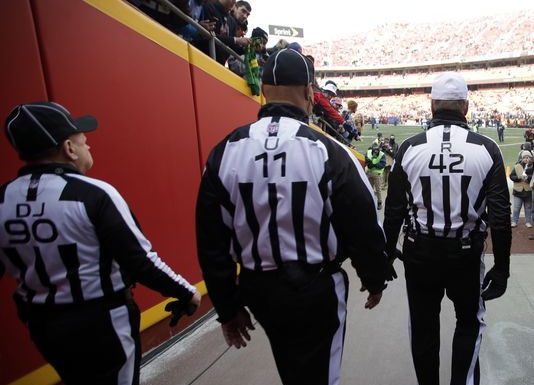
SportsPulse: USA TODAY Sports’ Jarrett Bell breaks down all the story lines coming out of wild-card weekend in the NFL.
No surprise, the NFL playoffs have already been marred by controversial officiating.
That’s too bad for players who sacrifice their bodies. Too bad for coaches whose livelihoods hinge on winning or losing the close ones. Too bad for fans trying to stomach sudden death for their teams — provided it’s fair and square. Too bad for the league, with mounting credibility issues on so many fronts, as it tries not to fumble away the appeal of its product.
But can’t say we didn’t see this coming.
Blunders during the wild-card round — including a Marcus Mariota fumble that was missed in Kansas City and late-game interceptions by Mike Adams in New Orleans and Jalen Ramsey in Jacksonville that illustrated the confusion in applying the rule constituting possession of the football — marked a continuation of regular-season issues.
It’s a shame that the NFL’s officiating, headed by a new director this season in Al Riveron, isn’t performing up to the level of the competition that rises in January.
Wonder what Steelers tight end Jesse James — his apparent game-winning touchdown lunge in a Week 15 loss to the Patriots was infamously ruled an incompletion — thinks of Ramsey’s pick that sealed the Jaguars’ win against Buffalo? Ramsey, the all-pro corner, made a spectacular play in snagging a ball he deflected after making a great break. But the replay showed that as he rolled on the turf, the football touched the ground. Like James, by the letter of the law, Ramsey did not “survive the ground.”
The inconsistency is maddening.
“I don’t really have anything good to say there, so I’m going to stay away from any comments about those guys,” Chiefs coach Andy Reid said when asked about referee Jeff Triplette’s crew follow the loss Saturday to Tennessee. “I don’t want to get fined. It’s not worth it. Whatever.”
That’s what you might call micro-criticism from Reid, but it got a point across. On the apparent Mariota fumble, Triplette ruled that the play was dead because the quarterback’s forward progress had stopped, nullifying the chance for a replay review.
Triplette later told a pool reporter, “The defender hit him and he was driving him back.”
Quite a quick whistle as the ball popped out while Mariota was on the way down. For all of the credit due the Titans for overcoming an 18-point deficit, they really caught a
break by a ruling that led to a field goal.
Later, Triplette nullified another apparent Mariota fumble when he was sacked on a two-point conversion attempt. It was seemingly returned by the Chiefs for two points that would have given them the lead. The whistle may have been intended to protect the quarterback from injury, but there’s still something to be said for allowing the play to finish. (There was no quick whistle, by the way, when Titans running back Derrick Henry was stripped after being smashed to the ground. A rreview, though, cleared that up — no fumble.)
So this is how Triplette, linked to so many controversial actions during his 22 years as an NFL official, goes out. According to reports, he will retire. Sadly, it’s fitting that Triplette leaves in a blaze of debatable calls, although it’s just as questionable how he drew a playoff assignment in the first place.
Panthers coach Ron Rivera was baffled, too, given two iffy crunch-time rulings — an intentional grounding flag on Cam Newton, who might have escaped the tackle box, and the Adams interception-turned-fumble that cost Carolina 16 yards of field position. Rivera said Monday that he never got an explanation for the Adams play and was still miffed about the grounding call.
If you thought centralized replay reviews would have fixed many of these issues, think again. There is no shortage of NFL coaches and team executives contending that rulings flowing from the command center at NFL headquarters in New York, under Riveron’s watch, exacerbates problems. Big Brother may be watching, but who knows how he’ll rule?
(And part of this could be an unintended consequence of better technology, with high-definition images able to capture the slightest movement and freeze the action, frame-by-frame. Now if they can only determine which fraction of a second clinches possession.)
But there has to be a better way.
Surely, Roger Goodell and the competition committee will tackle the issue again in the offseason. But that’s happened before, like with the expert panel that broke down the catch rule … leading us right back to this sunken place of inconclusive rulings too often adjudicated as if they are clear cut.
A striking postgame image from Jacksonville: Bills coach Sean McDermott undoubtedly seeking an explanation from referee John Hussey about the Ramsey interception. McDermott should have been on the phone with New York since Hussey is essentially a messenger when it comes to reviews, which is part of the problem.
Rather than rely on New York, the league needs to go back to empowering referees to conduct reviews on the field. It would be more efficient than the New York relay, in addition to demonstrating the referee is really in charge of handling the game.
Unintended or not, the message is that the refs can’t be trusted to conduct the reviews. And if the league doesn’t trust them, it undermines the entire process for the rest of us.
courtesy= usatoday.com

